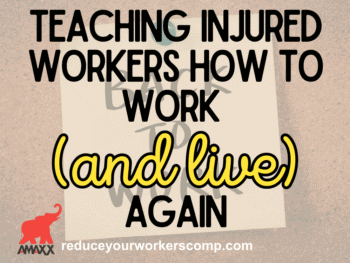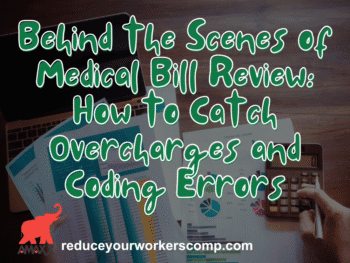Dealing with MRSA infections in workers’ compensation claims presents a number of challenges to the claims management team. Given the rise of these infections, it is important for the claim handlers to understand the basics of managing such claims. Dealing with these issues in an effective manner can help the employee return to work in a timely manner and reduce the cost to a workers’ compensation program
What is MRSA?
MRSA is known in the medical community as “Methicillin-resistant Staphylococcus aureus” infection. It is a strain of bacteria found the in the “staph family” that is dangerous and in some instances deadly. A main area of concern is that this family of staph-type bacterium is resistant to common antibiotics. This complicates the management of a workers’ compensation claim and can damage key vital organs such as the heart and lungs.
Click Link to Access Free PDF Download
“The 6-Step Process To Determine Workers’ Comp Injury Causation”
Compensability of MRSA Infections
Issues concerning compensability from infections are different in each jurisdiction. There are various factors, which come into place when analyzing these cases. Matters are also complicated based on the fact a person not working in a healthcare position could contract such a condition and make a claim for workers’ compensation benefits. Larson’s Workers’ Compensation Law touches to some extent on this issue when discussing contagious diseases that may be “ordinary.” Larson’s categorizes a MRSA infection in the same classification of claims involving heat, cold and elements exposure.
It is important to consider the following scenarios that could result in program exposure:
- Direct workplace exposure: Most jurisdictions allow an infection to be compensable if it arises from direct workplace exposure; the nature of one’s work is a factor to consider. In all likelihood, healthcare professionals who are exposed to infectious diseases would have an easier time proving their claim when compared to someone in a typical office or factory setting.
- Exposure during medical care and treatment: Issues concerning compensability in this setting vary. The general rule is that employers/insurers are responsible for medical care and treatment (and disability) resulting from the injury, as well as injuries that occur during such care. The injured worker still carries the burden of proof, but could argue that such infection was contracted during the course of medical care, especially if the treatment required an invasive surgical procedure. Claims of this nature must be handled with care and include exploring potential subrogation claims for medical malpractice.
Practice Pointers for Handling MRSA and Infection-Related Cases
Questions of compensability in workers’ compensation are fact dependent. Complex issues require the assistance of an attorney. An experienced claim handler should come to understand areas of inquiry that can assist on primary liability determinations prior to legal involvement.
When reviewing a claim for benefits involving MRSA, one should examine the following areas:
- A sudden onset of MRSA, or other staph-related symptoms and/or infections. These types of infections usually develop within a few days of exposure and contraction of the infection. Areas of investigation include where the claimant has been and persons they have had contact with prior to contracting a condition;
- Development of a MRSA related infection immediately following hospitalization or surgical intervention. Medical facilities and other areas that stress cleanliness are often a breeding ground for bacterial infections. Exposure to these conditions often occur during or after a hospitalization or surgery. It should be an area of investigation as to whether the claimant visited a medical facility to visit a family member or individual; and
- An established medical history on staph-related symptoms and/or infections.
Conclusions
Defending MRSA and other staph-related poses a series of difficult questions for the claim management team. Given the nature of these conditions, it is important that team members investigate fully all possible sources of contraction and defend the claim as appropriate.
Author Michael Stack, Principal, COMPClub, Amaxx LLC. He is an expert in workers compensation cost containment systems and helps employers reduce their work comp costs by 20% to 50%. He works as a consultant to large and mid-market clients, is co-author of Your Ultimate Guide To Mastering Workers Comp Costs, a comprehensive step-by-step manual of cost containment strategies based on hands-on field experience, and is founder of COMPClub, an exclusive member training program on workers compensation cost containment best practices. Through these platforms he is in the trenches on a working together with clients to implement and define best practices, which allows him to continuously be at the forefront of innovation and thought leadership in workers’ compensation cost containment. Contact: mstack@reduceyourworkerscomp.com.
©2016 Amaxx LLC. All rights reserved under International Copyright Law.
Do not use this information without independent verification. All state laws vary. You should consult with your insurance broker, attorney, or qualified professional.



























Well i have a question i have went yo er twice with a inflamed sore on my leh doctor looked at it n prescribed me amxocillen( how ever u spell that) so i would tKe it n even my doctor done the same thing when it came back, n so it has made two tunnels up my leg n so i have seen the er over sereval times for this n finally found a doctor that had a brain n she cultured it and it is staph n they said the culture is still growing n they prescribed me batrium sul., so are they prescribing me the right meds my leg is lanced open but from where it tunneled before it is inflamed again
Thank you 🙂
Thanks for the feedback Rebecca, I appreciate the input on incorrect information. I have made the appropriate updates.
Also, please update your last practice point – MRSA does NOT go into remission, this a bacteria not a virus. MRSA is a bacterial infection and like most bacterial infections can be treated with appropriate antibiotic selection and duration (and if necessary removal of infected tissue). There is no life-long MRSA treatment (the exclusion to this would be immunocompromised patients).
Please know that the appropriate abbreviation for Methicillin Resistant Staph Aureus is MRSA not MERSA. (there is no such thing as MERSA). Thanks.